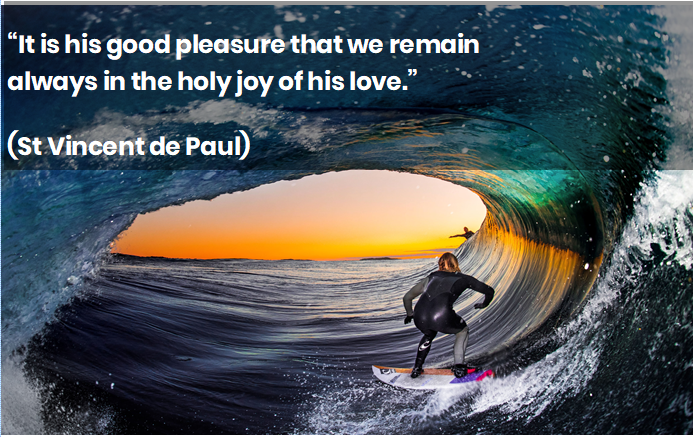
SVP Director for Membership Jon Cornwall shines a theological torch at the often misguided use of quotes.
I spend more time on social media than I care to admit, and occasionally in my 3am efforts to finish reading the internet I will come across an inspirational quotes, just like the one pictured above.
 You may have just looked at that image and thought to yourself… “that’s nice, let’s move on”. If you did then you are a far better person than I am. It seems that this is one of my great triggers. What is wrong with it? Let me count the ways, in no particular order.
You may have just looked at that image and thought to yourself… “that’s nice, let’s move on”. If you did then you are a far better person than I am. It seems that this is one of my great triggers. What is wrong with it? Let me count the ways, in no particular order.
Sin 1: totally unrelated picture of a minion, a cartoon character really quite famous for not actually saying anything quotable!
Sin 2: it’s Saint Teresa of Calcutta!!
Sin 3: and Saint Teresa of Calcutta never even said this!!!
Theologians and spiritual writers will tell you that the longer they immerse themselves in the writing of individuals the more in tune they become with the tone of their voice. Jesus has a direct authority, St Paul has a distinctive timbre and even Pope Francis has a South American embrace. If you use social media as a Christian, you will likely spend a good portion of your life seeing such pithy quotes written over a jarring, and often unrelated stock picture of sunsets, kittens and minions. (For anyone already expecting me to finish this blog with an image and a quote you are absolutely right, but I will ask for your patience before scrolling down).
These inspirational and poignant quotes from Nelson Mandela, Saint Augustine, Mother Teresa of Calcutta and Fulton Sheen will often be presented with a lovely frame, some flowers or a background containing an appropriate emoji. The academic in me is always challenged by these ‘brainy quotes’ and I am often frustrated that they have not been referenced properly, if at all. So, in recent years as an academic in the world of fake news, I have set about trying to get myself unfriended by all associates by fact-checking their inspirational quotes.
As we journey through this Awareness Month, perhaps those of us who feel so inclined ought to undertake a similar process with our quotes, sayings, prayers and phrases. If we have a favourite quote from St Vincent, have we sought to read it in context? There is an excellent chance that in the very next breath St Vincent would go on to expand further. When we find ourselves thinking about a principle set out for us by Blessed Frédéric, do we check to make sure we understand it correctly? Are we carrying on the vision of the founders of the Society or are we the well intentioned next players in an almost 200 year-long game of Chinese whispers? The more familiar we become immersed in Louise de Marillac, Blessed Frédéric and others the more we become familiar with the Vincentian tone, its warmth and often, I have to say, quickness to tell the reader off and remind them to fix their priorities on those we serve.
For the Vincentian today it is unlikely that the thing which inspires and motivates us is even a quote, it is far more likely to have been a moment. During these past years of serving within and working alongside the Society, I have been blessed with a great many moments which I can confidently say were Vincentian; they totally embodied the spirit and tone of St Vincent, the flavour and intention of our patron.
I trust that anyone reading this will be doing so because they have had one of these numinous moments themselves. I am happy to debate the point, but it is my sense that these Vincentian moments seem to have a number of things in common.
They are born from a place of deep respect, non-judgement and equality to the point where the provider places themselves as the lesser of the two parties.
They are moments which leave most parties overwhelmed, often not wishing to break the silence for fear of losing that profound feeling of peace and joy.
They leave both parties changed, sometimes instantly and sometimes not for decades later as they remember that moment as ‘different’.
They were rarely the product of a plan, more often they were unexpected, impulsive and visceral.
This moment was challenging, generous, intelligent and creative.
This moment yielded fruit far beyond that instant but encouraged yourselves and others to work differently somehow.
Contact with this moment changed the way you carried yourself for days afterwards.
This moment was profoundly true without being easily describable.
This moment was incredibly beautiful without being photogenic.
And as members describe so often, it was an honour, and we get as much from that moment, if not more so, than the beneficiary we strove to serve.
One of the fruits of the Holy Spirit which is often grossly misunderstood is that of ‘joy’. I am not sure if it is a result of years of associating it with the merriness of Christmas, but if you ask people to describe joy, they will so often tell you that it is happiness, elation, giddiness perhaps. I would argue that these Vincentian moments as described above are those of great wholeness, peace, gentleness, generosity and love, yet also one of joy. A fleeting, substantial moment where you are satisfied in a way which you fear you may not feel again for a long time. So, if I can find it in my next Google search, my poster at the end must have an inspirational quote from St Vincent which has been researched and speaks to our need for joy.
 But what of the background, what picture should my motivational poster have? A cat hanging from a washing line? The grotto in Lourdes where the veil between Heaven and Earth is at its thinnest? No, not this time. If I know anything from motivational posters the quote and the picture do not have to relate.
But what of the background, what picture should my motivational poster have? A cat hanging from a washing line? The grotto in Lourdes where the veil between Heaven and Earth is at its thinnest? No, not this time. If I know anything from motivational posters the quote and the picture do not have to relate.
For those who have met me, it may not surprise you that I am not a surfer. But I have often been awed by those incredible pictures of a surfer riding through a vortex, water above them, crashing over them as they barrel through a wave. What must that moment feel like? How wonderful a gift it must be for the created to be surrounded so inextricably by swirling, powerful creation. How desperate they must be to stay in that moment, to seek the thrill of it and to find themselves there. Our profound moments, meanwhile as Vincentians, are to be found in Christ and most especially when we bring Christ to those most in need.
As previously promised, I leave you with a jarring, inspirational poster with a quote from our patron.